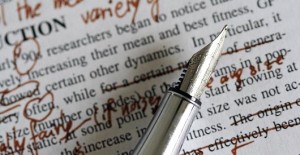
1) How good many of them are.
2) How poorly edited most of them are.
The ones I’ve read have more often than not been MUCH better than most people probably expect self-published books to be. The writers have some great ideas, and many really know how to tell a story. But alas, most self-published books are desperately in need of the loving attention of a good editor.
Mistakes I often see:
* Recurring grammatical problems. It seems that very few people can competently conjugate the verbs to lie and to lay, for example.
* Sloppy mistakes. Typos and misspelled words abound.
* Continuity problems. You don’t want your readers thinking: Wait a minute. Wasn’t this character in a restaurant when this conversation started? This frustrates readers, forcing them to click/look back to figure out what’s going on.
* Wrong word choice. Affect and effect, it and it’s, and your and you’re are common troublemakers, but weather and whether, then and than, and dozens of other pairs are often confused as well.
* Weird shifts of tense. Present tense can be used to good effect when telling a story, but don’t shift willy-nilly from past to present.
* Misplaced clauses and modifiers. These can provoke laughs (The patient was referred to a psychologist with severe emotional problems), but all too often they simply trip up the reader, drawing attention to the syntax and away from the story.
Please don’t get the idea that because your book needs editing that means you aren’t a good writer. All books need editing. Even greats like Ernest Hemingway, F. Scott Fitzgerald, and Thomas Wolfe counted on legendary editor Maxwell Perkins to turn their deathless prose into something publishable. We can’t all be so fortunate as to have our own Maxwell Perkins, but any serious writer needs to find a good editor he or she can work with.
It is nigh impossible to edit your own work. If you can’t afford a professional editor, at least let a literate friend take a blue pencil to your manuscript. I am a professional book editor and would be happy to discuss my services with any interested writers. However, I realize that many self-published writers are unable or unwilling to pay for professional editing services. If you can’t afford a pro, please let someone whose judgment you trust give your work an honest and thorough look before you hit the publish button.
Of course, even if you have dozens of editors champing at the bit to pick at your prose, you still want it as clean as possible when they see it. That means you should do some preliminary self-editing before you pass your work along. Here are some tips on how to edit yourself:
* Put the work aside for at least a few days before you edit it. And edit while you are fresh—if not first thing in the morning, at least after a little downtime.
* Look up everything that looks remotely suspicious. Train yourself to question everything. Are you sure you know the difference between nauseous and nauseated?
* If you aren’t comfortable with grammar, read a few books on the subject. The Big Ten Of Grammar: Identifying And Fixing The Ten Most Frequent Grammatical Errors by William Bradshaw is a good place to start. The Elements of Style by Strunk and White is charming, but mostly useless for what we are talking about here. It’s often misleading and sometimes just plain wrong. I’ll save my Strunk and White rant for another post, but for now, don’t let that book be your only guide.
You’ve spent a lot of time working on your book; you owe it to yourself to not skimp on the editing phase. Taking a little time to sweat the details and having someone else do the same for you can give your work the polish it needs to take it from, “This isn’t bad for a self-published book,” to “Wow. This is a very good book.”
Get an Editorial Review | Get Amazon Sales & Reviews | Get Edited | Get Beta Readers | Enter the SPR Book Awards | Other Marketing Services






















Leave A Comment